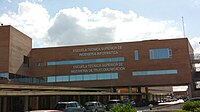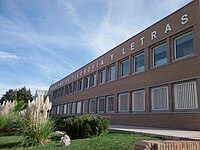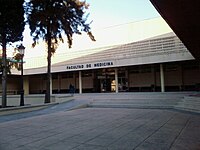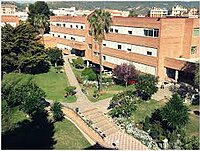Malaga University
The Universidad de Málaga or, according to its acronym, UMA, is a public university founded in 1972. Nearly 40,000 students study there and nearly 2,450 work teachers. It offers 63 undergraduate and 120 postgraduate degrees, including doctoral programs, master's degrees and its own degrees. The teachings are taught in 19 centers by professors assigned to 81 departments.
The vast majority of teaching is organized around two campuses in the capital, although the offer is also maintained in centers distributed in the urban center, as well as in Ronda and Antequera.
It is the promoter, together with the University of Seville, of the Andalucía TECH project, which obtained the category of Campus of International Excellence granted by the Ministry of Education of Spain.
UMA data
General information
- No. of teachers: 2578
- No. of students: 35 322 (graduates in grades: 30 740; graduate students: 538; Masters students: 2631; PhD students: 1413)
- No. of administrative and service staff: 1948
- No. of university departments: 81
University offer
- Number of degrees and double degrees: 63
- No. of PhD programs: 22
- Master's degree: 68
- N.o de títulos propias de posgrado: master's degree: 38, expert: 25, specialized courses: around 100 courses during the course
Research
- Research groups: 255, according to the UMA R & D+i offer catalogue, Research groups
- Patent wallet registered: 210
Library
- Volumes of books: 1 051 915; of which 267 331 are electronic
- Magazines: 25 464 titles of subscribed magazines, of which 21 020 in digital format
- Reading posts: 4912
History and information
The beginning
The history of the University of Malaga began in 1968 with the creation of the Association of Friends of the University of Malaga. This association, which included important local personalities among its members, sought the creation of the university due to the needs of the city, since it was the only city with a population of more than 300,000 that did not have one. His activity, together with the support of the media, managed to make the citizens of Malaga aware of the importance of having a university in the province.
The University of Malaga was founded by decree of August 18, 1972 after a long process, grouping centers that already existed at the end of the 60s: the School of Experts (1927), the Normal School (1846), the Faculty of Economics —dependent at that time of the University of Granada— (1963) and the Seminary (1587), where philosophy and theology were taught.
At the time of creation, the university had the Faculty of Economic and Business Sciences and the Faculty of Medicine, the latter created after the ratification of the decree. Its first location was the El Ejido campus along with various administrative centers scattered throughout the city. In addition, it has a nursing school outside the capital, in Ronda, and a teaching school in Antequera.
Transfer to Teatinos
Little by little, the faculties are changing their location towards the district of Puerto de la Torre, which was practically undeveloped at that time. This was the case with the Faculty of Philosophy and Letters, which initially was located in two buildings in the center of the city and which in 1985 was permanently installed on the new Teatinos campus. The Faculty of Sciences would be added to this faculty, as well as other centers that were establishing their headquarters there.
Last years: innovation and technological support
After several years of constant change, it has become a public university with an average enrollment of 37,000 students per year and 4,000 graduates per year (2002) working side by side with 1,800 researchers (2001). Since the year 2000, it stands out in the commitment and promotion of technological research in Andalusia with projects such as Andalucía TECH, campus of international excellence; his collaboration with the Parque Tecnológico de Andalucía or the Picasso supercomputer in 2007.
Among his latest projects, the launch of Link by UMA-ATech stands out, an important space for business, university and innovative coexistence where entrepreneurs create their companies and progress in them from scratch. In addition, here the already consolidated businesses find new ways to continue growing. Link brings together associations, students, companies, entrepreneurs and all kinds of experts to share ideas, learn and grow together.
The promotion of employment among graduate students is another of the strategic points of the University of Malaga, which has the specific Employability and Entrepreneurship service that manages business practices with various organizations and entities, job offers as well as orientation and training activities. In addition, every year the Employment Fair is held at the University of Malaga, which brings together a multitude of companies on campus in order to establish ties and contacts with students.
On the other hand, sustainability and respect for the environment are values that constitute the hallmarks of the University of Malaga. Through the Vice President of Smart-Campus, a multitude of activities are organized throughout the year, among which Green Week, various contests and various volunteers in natural enclaves of Malaga and its province stand out.
Campus of International Excellence
Since 2008, the university began preparing its project to present itself as a campus of international excellence to the call organized by the Ministry of Education in 2009. In that year, its candidacy was left to the doors of moving on to the final selection, obtaining a mention of 'Excellent Research and Transfer Campus' for two projects: one on tourism and the other on heritage, for which reason a year later he would try again.
It is then that Andalucía TECH emerges, as a joint project with the University of Seville to apply for the call. Its commitment is focused on technological development in Andalusia, with special attention to new energies, biotechnology and communications. They also highlight the participation of the technology parks of the autonomous community and strong support from the Andalusian government.
It was in 2010 when it was finally recognized as a campus of excellence after going through a committee of nine internationally renowned experts, who assessed not only the number of agents added to the project, but also the business, political, economic and social of these.
The CEI Andalucía Tech specializes in Production Technologies, Information, Communications and Biotechnology and has six "Poles of Excellence": Aerospace, Biotechnology for a Healthy Society, Communications and Mobility, Energy and Environment, Tourism and Development Territorial, and Transportation.
The creation of this unique campus between the Universities of Seville and Malaga has led to the creation of joint degrees that allow students to obtain a degree certified by both institutions and that try to adapt to the new needs of society, such as degrees in East Asian Studies, Biochemistry, Energy Engineering, Health Engineering, Industrial Organization Engineering, and Electronic, Robotics, and Mechatronics Engineering.
Research
Currently, the University of Malaga has 263 research groups, 44 international projects, 92 National Plan projects and 7 collaborative national projects. In addition, it has 532 agreements and contracts with companies or entities and a portfolio of 248 patents. The UMA also has a modern network of research infrastructures that brings together a wide variety of laboratories.
Mobility
The stay in other universities, both national and international, is an enrichment, not only for professional life, but also personal. The UMA promotes the possibility of studying part of the studies in another foreign university with programs in Europe, North America, Latin America, Asia and Oceania. For this, there is a set of Help Programs and Scholarships that you can apply for. Likewise, the University of Malaga receives hundreds of students every year with the aim of completing their university education here.
Equality
The University of Málaga has an Equality Unit, which was created by making a reality the firm commitment and commitment to the active equality policies that the institution has been developing and complying with the twelfth additional provision of the Organic Law 4/ 2007 of Universities, published in the Official State Gazette on April 13, 2007 and which modified the 2001 Law on Universities.
The objective of the Equality Unit is the development of the functions carried out with the principle of equality between men and women. Among its main achievements are the implementation of the protocols against sexual harassment based on sex and sexual orientation and gender identity, as well as the protocol for action in cases of transsexuality, transgenderism and intersex.
In addition, the University of Malaga, through the Delegation of the Rector for Equality and Social Action, together with the Ministry for Equality and Social Welfare, once again launches the Aula de Mayores +55, with the aim of giving an opportunity to those people who, now, after finishing their work stage or due to other circumstances, wish to access training and general culture, providing them with a space for cultural, social and scientific debate, and offering them an ideal framework for intergenerational coexistence.
Attention to Diversity and university defender
The University of Málaga, through its Office of the Vice-Rector for Students, has an office dedicated to the attention of its students with disabilities (SAAD). The SAAD is aimed at guiding and assisting people with disabilities, with a percentage of disability similar to or greater than 33%, who wish to enter or are enrolled at the University of Malaga in the Bachelor's Degrees and Official Master's Degrees, trying to compensate and respond to the special needs that they present derived from their disability. The Diversity Attention Service carries out different programs and actions aimed at guaranteeing equal opportunities and the full integration of university students with disabilities in academic life, and raising awareness in the university community.
In addition, the university community has the office of the university ombudsman, whose areas of action are focused on consultations, complaints, claims and mediation and conciliation procedures.
Awards and recognitions
Throughout its history, the University of Malaga has been awarded various prizes and recognitions. Some of them are:
Excellent rating among international students.
Recognition for their commitment to the Global Compact.
Finalist of the third edition of the 'Telefónica Ability' awards, public recognition of institutions that develop sustainable models with the inclusion of people with disabilities.
Accreditation from the Instituto Cervantes to teach Spanish as a foreign language.
2015 Meridiana Award from the Andalusian Women's Institute for the 'Los Buenos Tratos' campaign.
Gold Badge 2014 from the CUDECA Foundation.
First Spanish public university with the Bequal Seal for integrating equality policies in all its areas.
First in the Andalusian ranking in the "Fourth Transparency Report on Spanish Universities".
"A" from the Ministry of Education for Andalucía Tech for its five years of activity.
Campus
Although the rectory of the University of Malaga is located in the old Post Office and Telegraph House, in the historic center of the city, most of its facilities and teaching centers are spread over two main campuses:
Theatinos Campus
Also called University City, it is located in the district of Puerto de la Torre. It is integrated around the Louis Pasteur landscaped boulevard near the Teatinos neighborhood, and most of the faculties and technical schools are located there: Communication Sciences, Education Sciences, Law, Computer Engineering, Telecommunications Engineering, Tourism, Sciences, Philosophy and Letters, Medicine, Psychology, Industrial Engineering, Social and Labor Studies, Commerce and Management and Health Sciences. It also has five classrooms: Gerald Brenan Lecture Hall, López de Peñalver Lecture Hall, Professor Juan Antonio Ramírez Lecture Hall (no. 4), Rosa Gálvez Lecture Hall (no. 5) and Severo Ochoa Lecture Hall.
The Botanical Garden of the university is also located here, and Incheon University has an office on this campus for its international relations and to promote mobility between students, professors, and researchers from both academic institutions. other services such as the General Library, the Publications Service, the Research Institutes Building, the Nursery School, the University Sports Complex, a network of Computer Rooms and a wide range of cafeterias and university canteens.
After the expansion process, it now houses some educational centers that were previously located in El Ejido. It also has a metro line that connects the entire campus.
Currently, the university campus has implemented a series of measures to make the return to face-to-face classes, which had been suspended due to Covid-19, safer. The most visible are the installation of hydroalcoholic hand gels in all entrances and exits, in addition to the installation of QR codes that must be scanned when entering and leaving the facilities, in order to keep track of possible infected people. On the other hand, the capacity of the classrooms has been reduced for a safer education.
El Ejido Campus
Located in the downtown district of Malaga, it was the first area where the university facilities were concentrated and which are currently being moved to Teatinos. However, the Faculty of Economic and Business Sciences, the Faculty of Fine Arts, the Higher Technical School of Architecture, the Paraninfo and the Government Pavilion still remain in it.
Other locations
The University of Malaga also has various centers throughout the city, which do not belong to either of the two campuses:
- Building of the Spanish Courses for Foreigners of the UMA, located in the old building of the Faculty of Labour Sciences in El Palo. Previously on Avenida de Andalucía.
- Residencia Universitaria Alberto Jiménez Fraud, located in the neighborhood of La Barriguilla.
- Grice-Hutchinson Experimentation Center located next to MA-21, near San Julián.
Other centers in the province of Malaga:
- University School of Round Nursing
- University School of Antequera
The Technology Park of Andalusia integrates the Image Technology Center of the UMA and the Office for the Transfer of Research Results (OTRI). The heritage of the University of Malaga is completed with the Bioinnovation building and the La Mayora Experimental Station.
Organization
Government
The governing bodies of the University of Malaga are structured into three hierarchical levels:
- Board of Directors: formed by the Rector, the Vice-Rectors, the Manager and the general secretary.
- Rector: D. José Ángel Narváez Bueno
- Vice-Rector of Studies: D. Ernesto Pimentel Sánchez
- Vice-rector of Research and Transfer:D. Juan Teodomiro López Navarrete
- Vice-Rector of Students and Sports: D. José Francisco Murillo Mas
- Vice-Rector of Teaching and Research Personnel: D. Tomás Cordero Alcántara
- Vice-Rector of Culture: Tecla Lumbreras Krauel
- Vice-rector of Smart-Campus: Dña. Raquel Barco Moreno
- Vice-rector of Social Innovation and Entrepreneurship: D. Rafael Ventura Fernández
- Vice-Rector of Strategic Planning and Statistical Development: D. Gaspar Garrote Bernal
- Vice-Rector of Mobility and International Cooperation: Dña. Susana Cabrera Yeto
- Vice-Rector of Social Projection and Communication: D. Juan Antonio García Galindo
- Vice-Rector for Equality, Diversity and Social Action: Dña. Isabel Jiménez Lucena
- Vice-Rector of Business, Territory and Digital Transformation: D. Francisco Javier López Muñoz
- Director of the Doctorate School: Dña. Magdalena María Martín Martínez
- Director of the Services Inspectorate: D. José Joaquín Quirate Sánchez
- Manager: Dña. María Jesús Morales Caparrós
- Secretary-General: Miguel Porras Fernández
Colleges and schools
The University of Malaga is made up of 4 schools, 13 faculties, 2 affiliated centers and 5 classrooms:
Culture
As a higher education and research center, the University of Malaga carries out an important cultural and scientific outreach activity, fundamentally oriented towards the province. Among the activities it carries out, the FANCINE or Malaga Fantastic Film Festival stands out, as well as the Choir and the Chamber Orchestra of the University of Malaga.
Cultural Container
The Cultural Container is a place for the projection of new talents, mainly students from the 10 public universities of Andalusia, where you can find the most alternative and innovative proposals of the current cultural scene.
Here the student has a free space for creation and cultural offerings. Cinema, theater, dance, music creations, workshops and any imaginable project. Both spectators and creators can enjoy the new Container on the Teatinos Campus.
Fantastic Film Festival
Fancine, as the Fantastic Film Festival of the University of Malaga is also known, is an annual film festival that has been held in Malaga since 1990 without interruption, dedicated to fantastic and fiction films. It is one of the oldest festivals in the Andalusian community and stands out for being the only festival of its kind in Spain financed by a public university.
Choir and orchestra
The university choir was born in January 2004. Initially formed by a small group of students rehearsing to sing music of the century XVI, it soon began to grow until it was finally permanently linked to the institution when it began to depend directly on the Office of the Vice President for Culture, and is currently made up of some twenty-five people, all of them belonging to the university community (students, professors, and personal). He frequently participates in concerts throughout the province of Malaga, especially during Holy Week, as well as in official University events. His repertoire covers the music of the Spanish Renaissance and especially the works composed by Tomás Luis de Victoria and the Andalusians Francisco Guerrero and Cristóbal de Morales.
Along with the choir, the university also has a chamber orchestra.
Ridhom Uma
The “Ridhom” Theater Association was created with the aim of disseminating and developing theater in all its fields, dance, dancing and singing. Their objective is to consider the Theater as a cultural fact, giving the opportunity to the students of the Faculty of Education of the University of Malaga especially, to participate in the works that will be represented in the Faculty, in the university and in other theaters of the province. They intend to generate an entertaining and playful activity by selecting plays and theatrical adaptations, in addition to those created by the association or by its members. They seek to promote and carry out Theater, in addition to enriching the theatrical capacities of those interested, seeking to awaken interest in Theater, through its study, promotion and dissemination.
It is a young theater group that has been together since 2012 carrying out projects at the Faculty of Education such as the musical “Grease”, the musical “Today I can't get up” and "Los 40 principales". This academic year 2015/16 they plan to represent "The Wizard of Oz" again. They put all their effort and enthusiasm into each project they carry out, always looking for the best possible result.
To be able to participate in Ridhom it is not necessary to have previous theatrical experience, the only thing that is required is that those interested want to do theater.
Sports
The University of Malaga competes in the Spanish University Championships organized by the Spanish University Sports Committee, both at the regional and national level, offering its students the chance to be part of their teams. In 2011 it won first place in the medal table in the regional phase. In 2008, he won the Spanish University Men's Basketball Championship and since 2006 he has won 5 bronzes and two silvers in the Spanish University Women's Rugby Championship. The Junta de Andalucía Trophy 2014, which distinguishes the University with the best results in the Andalusian University Championships, corresponded to the University of Malaga.
Sports facilities
Located on the Teatinos campus, the facilities of the sports complex of the University of Malaga are mainly made up of an indoor sports court with more than 2,000 square meters of sports space and a capacity for the public of 1,400 people, used mainly for soccer, basketball and volleyball; as well as a rugby field with an athletics track (both with a capacity of more than 2,400 people) and an artificial grass soccer field.
It also has a soccer field with natural grass, a heated swimming pool, multi-sports courts for paddle tennis and tennis (both indoor and outdoor), a gym and a cardiovascular and fitness room.
Around the entire sports complex is a natural running circuit for physical exercise.
General Foundation of the University of Malaga
In 1996, the General Foundation of the University of Málaga (FGUMA) was established, whose objectives are to promote and disseminate activities related to research and study of science, technology, humanities and arts, as well as the sport; by itself or together with other institutions. In addition, its work is to collaborate with the University of Malaga, of which since 2017 it is "own medium", to promote its consolidation as a prestigious academic institution, as well as to help the progressive increase in the quality of teaching and research to the encouragement from the university community.
In compliance with the objectives of the entity and in order to complement university education, a wide variety of courses are offered, both face-to-face, seasonally renewed, and distance learning, designed on an annual basis, and, in both cases, with academic recognition, normally 1 ECTS credit. Likewise, through the language center of the Teatinos campus, FGUMA organizes a series of language courses with their corresponding official exams (with the exception of Japanese). These languages are currently: Spanish, English, German, Italian, Japanese and Korean.
Apart from these two main lines of training activities, it also organizes various free events such as the talks in the “Dialogando” cycle, where Manu Sánchez, Marta Flich or Chema Alonso have participated, among others, or the recent cycle “Radar, ideas new for a common future”. Any citizen can participate in all its events, activities and courses, whether or not they belong to the university community, although granting the latter a certain reduction in the prices of the activities and, especially, of the courses.
Likewise, among its main lines of action to promote innovation, training and contact with the business world, a series of annual awards are organized, highlighting the awards for research, environmental photography and the "Spin" awards. -Off" that have the purpose of "promoting the entrepreneurial activity of Malaga university students (...)".
Contenido relacionado
Scouting in Spain
Henri Fayol
Transformational generative grammar










